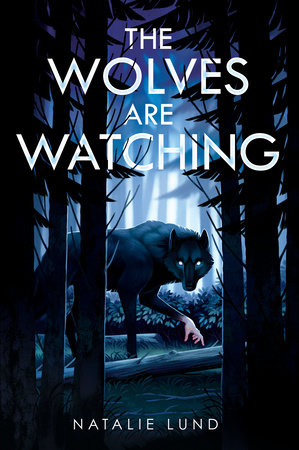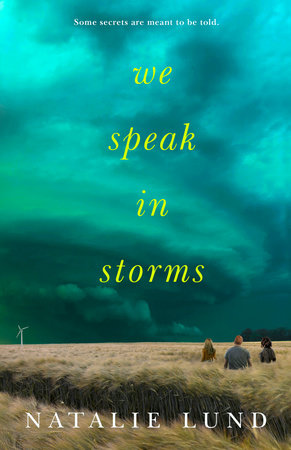
The Sky Above Us
Praise for The Sky Above Us:
"Lund is especially deft here at crafting and honoring differing perspectives around shared events, remaining keenly aware of the ways in which vulnerabilities and insecurities shade an experience with hues specific to that person . . . . This is a bruising look at loss from many angles, and it will leave readers wondering how their conceptions of their own truths and perceptions of others lead to pain and heartbreak." --BCCB
Praise for Natalie Lund's debut We Speak in Storms:
"A hauntingly atmospheric coming-of-age story . . . with fully realized characters, an empowering message, and a highly satisfying conclusion." --SLJ
"A lingering, quietly paced story about the echoes of trauma and the persistence of hope." --Booklist
"This suspenseful novel . . . immediately grabs the reader's attention . . . [Readers] will be eager to find out what happens next." --SLC
"Lund is especially deft here at crafting and honoring differing perspectives around shared events, remaining keenly aware of the ways in which vulnerabilities and insecurities shade an experience with hues specific to that person . . . . This is a bruising look at loss from many angles, and it will leave readers wondering how their conceptions of their own truths and perceptions of others lead to pain and heartbreak." --BCCB
Praise for Natalie Lund's debut We Speak in Storms:
"A hauntingly atmospheric coming-of-age story . . . with fully realized characters, an empowering message, and a highly satisfying conclusion." --SLJ
"A lingering, quietly paced story about the echoes of trauma and the persistence of hope." --Booklist
"This suspenseful novel . . . immediately grabs the reader's attention . . . [Readers] will be eager to find out what happens next." --SLC
- Pages: 384 Pages
- Publisher: Penguin Young Readers Group
- Imprint: Viking Books for Young Readers
- ISBN: 9780525518044
An Excerpt From
The Sky Above Us
Janie
The day of
THE SUN BREAKS over the horizon, glistening off the Gulf. It’s the only time the Gulf manages to look beautiful, to shake off her muddy cloak and stand, broad and shining. The summer party ended hours ago, but nearly twenty of us are still here, sprawled across the beach like seals. Warmed by the new sun, scratching the sand out of our scalps. In the breeze, empty beer cans skitter toward the ocean and a few more of us wake.
I woke near Cass and Izzy—though not with them. They try to pretend they like me for more than just my supply of weed, occasional free snacks at the movie theater where I work, and rides in my Honda hatchback, but we all know that’s not true.
When I try to sit, the world spins and I taste stomach acid in my throat. I watch the sky instead, the sand cold and hard against my back. The tide is out, the waves a distant hiss. Beside me, Cass sits, brushes sand from her skin, and squeezes her bronze curls. She reminds me of the palms, tall and curveless but wild on top. Izzy is on her stomach with her arms stretched above her head and her legs straight out, sleeping. Awake, she’s so careful to stack herself like a model—chest up, shoulders back, hands on hips, ankles crossed—that it’s strange to see her free-falling, a skydiver.
The newly risen sun disappears behind a cloud and the world turns gray and lavender, transforming our beach into something from a war—the dead and injured strewn as far as the eye can see. Izzy, the corpse. Cass, the mad. Me, the paralyzed. In the shadows, the ocean returns to her muddy brown. Adventure Pier, a mile to the southwest, has been cast in black—the Ferris wheel, roller coaster, and pirate ship now silhouettes.
Somewhere above the beach, we hear the hum of a prop plane, distant at first but growing louder and louder. It’s too early for the planes that tow banners across the sky, and this plane sounds like it is flying far too low. I tilt my chin up and look to the seawall behind us as the plane clears it. There are gasps. There is scrambling. Izzy shouts Cass’s name. I watch the white underbelly of the plane, lift my hand as though I’ll be able to skim it with my fingers. And then it is over us, over the flat expanse of beach, the scuttling crabs, the sand-bedded mussels, the skipping gulls.
I rub my eyes, forgetful of the sand, and then try to blink away the grit, the stinging.
“Israel?” Izzy says to the plane. It has a red stripe and is bigger than the planes that spray for mosquitoes, though not by much. If her twin is inside that plane, Shane and Nate must be too. They’ve been an inseparable trio since freshman year.
My heart hammers in my chest, up my neck, behind my eyes. Last night I watched Nate and his braced knee limp from group to group, Solo cup in hand, his hair pulled back into its bun, occasionally giving that half smile that has made me melt since seventh grade. No one at school knew we were friends—not just friends. Something more. He was the one who invited me to the party, but he barely acknowledged me, and something finally snapped. I marched up to him to ask why—right in front of everyone. He pulled me away from the fire and told me he was scared that he couldn’t escape it. Escape what? I asked. This double life you’ve built? I told him I couldn’t pretend anymore, that I was finally done.
I started drinking—something I usually avoid because of my dad—to numb my pain. And once I felt loose, I dragged my heart around after Izzy and Cass—the closest to friends I had at that party—laughing when they laughed, dancing when they danced, though my limbs were jerky, my bounce off-beat. I had to keep a smile pasted on my face because the smile was the trapdoor holding back the feral thing inside me that wanted to growl and kick sand over Nate, to bury him. He’d drifted off early, his sweatshirt cinched around his face, his arms folded in so he appeared even smaller than usual.
Now, in this dim light, all I want to see is Nate’s small limping form, his bunhead, his half smile.
The plane begins to climb, slower than it should and at an impossible incline over the waves, which run their morning laps obliviously. Around me, everyone is awake. On their elbows, their knees, their feet, looking out at the Gulf. I manage to stand despite the rocking sensation inside my stomach.
The last time Nate and I were on this same beach, we were alone, our lips swollen from kissing, the moon illuminating the neat surgery scar along his knee—my dad’s work. I told him I was applying to an ivy-walled northeastern college to study literature and screenwriting, and he said, “I want to be up there,” and pointed at Orion’s Belt. I laughed, didn’t I? Even though he had been checking out a lot after the knee surgery, his face emptying when we were in the middle of conversations.
The plane is as high as the distant roller coaster now, higher.
It stalls, hovering, and we stop breathing; even the gulls hush, a collective holding. Then there’s a sound coming from my throat: a high whine turning shriek. It’s echoed across the beach. We all seem to sense what comes next: the plunge. In the purple-gray light, our awe becomes ghastly. Like disgust. Cass grabs my hand and Izzy’s. I imagine we must look so small to the boys in the plane—if it’s really them—a chain of sand dandelions.
“Israel!” Izzy shrieks. Nate? my heart asks.
I wonder: Does what goes up have to come down? Can you climb higher? Can you free yourself? Can you shrink to tiny specks and disappear from our sight? Can you—would you really—leave us behind?”








